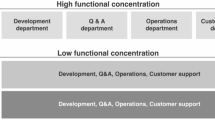Abstract
Along with recent advances of team-AI collaboration, we observe the emergence of adaptive, collaborative, and explainable AI technologies that spur the creation of organizational knowledge for group decision-making. This is substantiated by the explicit and tacit knowledge that decision-makers can create with AI and by the procedural support that AI can provide for the organizational knowledge conversion processes among decision-makers. However, research on AI design for effective organizational knowledge creation is in a nascent state. This is problematic because this leaves organizations without guidance for the implementation and assessment of AI that enables effective knowledge creation. We see potential in robo-advisors, which represent a form of AI, to facilitate such organizational knowledge creation for decision-making in economic contexts. We aim to realize this potential and apply an action design research approach to identify meta-requirements and design principles for a robo-advisor prototype. The robo-advisor is contextualized in the after-sales domain of a German car manufacturer, the Dr. Ing. h.c. F. Porsche AG, where complex decision problems are informed and solved by expert groups. The robo-advisor prototype contributes to collaborative knowledge creation that informs the group’s decision-making on field measures in the event of product quality issues aimed at ensuring product safety and customer satisfaction.
Access this chapter
Tax calculation will be finalised at checkout
Purchases are for personal use only
Similar content being viewed by others
References
Alavi, M., Leidner, D.E.: Review: knowledge management and knowledge management systems. MIS Q. 25, 107–136 (2001)
Grant, R.M.: Toward a knowledge-based theory of the firm. Strat. Mgmt. J. 17, 109–122 (1996)
Nonaka, I., von Krogh, G.: Tacit knowledge and knowledge conversion. Organ. Sci. 20, 635–652 (2009)
Nonaka, I.: A dynamic theory of organizational knowledge creation. Organ. Sci. 5, 14–37 (1994)
Argote, L., Lee, S., Park, J.: Organizational learning processes and outcomes: major findings and future research directions. Manag. Sci. 67, 5399–5429 (2021)
Huber, G.P.: Organizational learning: the contributing processes and the literatures. Organ. Sci. 2, 88–115 (1991)
Kogut, B., Zander, U.: What firms do? Coordination, identity, and learning. Organ. Sci. 7, 502–518 (1996)
March, J.G.: Exploration and exploitation in organizational learning. Organ. Sci. 2, 71–87 (1991)
Zercher, D., Jussupow, E., Heinzl, A.: When AI joins the team: a literature review on intragroup processes and their effect on team performance in team-AI collaboration. In: ECIS 2023 Proceedings (2023)
Seeber, I., et al.: Machines as teammates: a collaboration research agenda. In: HICCS, vol. 57 (2018)
Sturm, T., et al.: Coordinating human and machine learning for effective organization learning. MIS Q. 45, 1581–1602 (2021)
Anthony, C., Bechky, B.A., Fayard, A.-L.: “Collaborating” with AI: taking a system view to explore the future of work. Organ. Sci. 34, 1672–1694 (2023)
Cabitza, F., Campagner, A., Simone, C.: The need to move away from agential-AI. Int. J. Hum. Comput. 155, 102696 (2021)
Brynjolfsson, E., Mitchell, T.: What can machine learning do? Workforce implications. Science 358, 1530–1534 (2017)
Argote, L., Miron-Spektor, E.: Organizational learning: from experience to knowledge. Organ. Sci. 22, 1123–1137 (2011)
Tertilt, M., Scholz, P.: To advise, or not to advise— how robo-advisors evaluate the risk preferences of private investors. JWM 21, 70–84 (2018)
Sironi, P.: FinTech Innovation. Wiley, West Sussex (2016)
Jung, D., Erdfelder, E., Glaser, F.: Nudged to win: designing robo-advisory to overcome decision inertia. In: ICIS 2018 Proceedings (2018)
Namyslo, N.M., Jung, D.: Towards designing robo-advisory to promote consensus-efficient group decision-making in new types of economic scenarios. In: ECIS 2023 Proceedings (2023)
Cichocki, A., Kuleshov, A.P.: Future trends for human-AI collaboration. Comput. Intell. Neurosci. 1–21 (2021)
Rai, A., Constantinides, P., Sarker, S.: Next-generation digital platforms: toward human–AI hybrids. MIS Q. 43, iii–ix (2019)
Sein, M.K., Henfridsson, O., Purao, S., Rossi, M., Lindgren, R.: Action design research. MIS Q. 35, 37–56 (2011)
Lesjak, D., Natek, S.: Knowledge management systems and tacit knowledge. IJIL 29, 166 (2021)
Phang, C., Kankanhalli, A., Sabherwal, R.: Usability and sociability in online communities. JAIS 10, 721–747 (2009)
Yi, J.: Externalization of tacit knowledge in online environments. IJEL 5 (2006)
Fügener, A., Grahl, J., Gupta, A., Ketter, W.: Will humans-in-the-loop become borgs? Merits and pitfalls of working with AI. MIS Q. 45, 1527–1556 (2021)
Lyons, J.B., Sycara, K., Lewis, M., Capiola, A.: Human-autonomy teaming: definitions, debates, and directions. Front. Psychol. 12 (2021)
McNeese, N.J., Demir, M., Cooke, N.J., Myers, C.: Teaming with a synthetic teammate. Hum. Factors 60, 262–273 (2018)
Agrawal, A., Gans, J., Goldfarb, A.: How AI will change the way we make decisions. HBR 26, 1–5 (2017)
Bansal, G., Nushi, B., Kamar, E., Weld, D.S., Lasecki, W.S., Horvitz, E.: Updates in human-AI teams: understanding and addressing the performance/compatibility tradeoff. In: AAAI, vol. 33, pp. 2429–2437 (2019)
Metcalf, L., Askay, D.A., Rosenberg, L.B.: Keeping humans in the loop: pooling knowledge through artificial swarm intelligence to improve business decision making. Calif. Manage. Rev. 61, 84–109 (2019)
Fügener, A., Grahl, J., Gupta, A., Ketter, W.: Cognitive challenges in human-artificial intelligence collaboration. ISR 33, 678–696 (2019)
Jussupow, E., Spohrer, K., Heinzl, A., Gawlitza, J.: Augmenting medical diagnosis decisions? An investigation into physicians’ decision-making process with artificial intelligence. ISR 32, 713–735 (2021)
Wang, J.F.: An Affordance Perspective of RAs 2.0: Theorizing the New Generation of Recommendation Agents (2021)
Cao, G., Duan, Y., Edwards, J.S., Dwivedi, Y.K.: Understanding managers’ attitudes and behavioral intentions towards using artificial intelligence for organizational decision-making. Technovation 106 (2021)
Jung, D., Dorner, V.: Decision inertia and arousal: using NeuroIS to analyze bio-physiological correlates of decision inertia in a dual-choice paradigm. In: Davis, F.D., Riedl, R., vom Brocke, J., Léger, P.-M., Randolph, A.B. (eds.) Information Systems and Neuroscience. LNISO, vol. 25, pp. 159–166. Springer, Cham (2018). https://doi.org/10.1007/978-3-319-67431-5_18
Kobets, V., Petrov, O., Koval, S.: Sustainable robo-advisor bot and investment advice-taking behavior. In: Maślankowski, J., Marcinkowski, B., Rupino da Cunha, P. (eds.) Digital Transformation, pp. 15–35. Springer, Cham (2022). https://doi.org/10.1007/978-3-031-23012-7_2
Torno, A., Bähnsch, S., Dreyer, M.: Taming the next wolf of wall street–design principles for ethical robo-advice. In: PACIS 2022 Proceedings (2022)
Rico-Pérez, H., Arenas-Parra, M., Quiroga-García, R.: Scientific Development of Robo-Advisor: A Bibliometric Analysis (2022)
Namyslo, N.M., Jung, D., Rieker, T.: The use of robo-advisory and AI in reliability analysis for field measure decision-making. In: VDI, pp. 257–270 (2023)
Webster, J., Watson, R.T.: Analyzing the past to prepare for the future: writing a literature review. MIS Q. 26, xiii–xxiii (2002)
Paetsch, F., Eberlein, A., Maurer, F.: Requirements engineering and agile software development. In: Proceedings of the IEEE WETICE (2003)
Shirley, G., Kruse, C.L., Stefan, S.: Research perspectives: the anatomy of a design principle. AIS 21, 1622–1652 (2020)
Kanawattanachai, Y.: The impact of knowledge coordination on virtual team performance over time. MIS Q. 31, 783 (2007)
Faraj, S., Sproull, L.: Coordinating expertise in software development teams. Manage. Sci. 46, 1554–1568 (2000)
Wu, M., Gao, Q.: Understanding the acceptance of robo-advisors. In: HCI, pp. 262–277 (2021)
Levin, D.Z., Cross, R.: The strength of weak ties you can trust. Manag. Sci. 50, 1477–1490 (2004)
Nourallah, M.: One size does not fit all: young retail investors’ initial trust in financial robo-advisors. J. Bus. Res. 156, 113470 (2023)
Ruf, C., Back, A., Weidenfeld, H.A.: Designing Tablet Banking Apps for High-Net-Worth Individuals (2015)
Hildebrand, C., Bergner, A.: Conversational robo advisors as surrogates of trust. J. Acad. Mark. Sci. 49, 659–676 (2021)
Deng, B., Chau, M.: Anthropomorphized financial robo-advisors and investment advice-taking behavior. In: Proceedings of the AMCIS, vol. 4 (2021)
Zhang, G., Chong, L., Kotovsky, K., Cagan, J.: Trust in an AI versus a human teammate. CHB 139, 107536 (2023)
Harris-Watson, A.M., Larson, L.E., Lauharatanahirun, N., DeChurch, L.A., Contractor, N.S.: Social perception in human-AI teams. CHB 145, 107765 (2023)
Sabir, A.A., Ahmad, I., Ahmad, H., Rafiq, M., Khan, M.A., Noreen, N.: Consumer acceptance and adoption of AI robo-advisors in fintech industry. Mathematics 11, 1311 (2023)
Ruf, C., Back, A., Bergmann, R., Schlegel, M.: Elicitation of requirements for the design of mobile financial advisory services. In: HICCS (2015)
Gomez, C., Unberath, M., Huang, C.-M.: Mitigating knowledge imbalance in AI-advised decision-making through collaborative user involvement. Int. J. Hum. Comput. 172 (2023)
Nussbaumer, P., Matter, I., Schwabe, G.: “Enforced” vs. “casual” transparency. ACM Trans. Manage. Inf. Syst. 3, 1–19 (2012)
Westphal, M., Vössing, M., Satzger, G., Yom-Tov, G.B., Rafaeli, A.: Decision control and explanations in human-AI collaboration. CHB 144 (2023)
Heinrich, P., Schwabe, G.: Facilitating informed decision-making in financial service encounters. Bus. Inf. Syst. Eng. 60, 317–329 (2018)
Nonaka, I.: The knowledge-creating company. HRB 85(7/8), 162–171 (2007)
Huang, K.-Y., Güney, S.: Toward a framework of web 2.0-driven organizational learning. CAIS 31 (2012)
Author information
Authors and Affiliations
Corresponding author
Editor information
Editors and Affiliations
Rights and permissions
Copyright information
© 2024 The Author(s), under exclusive license to Springer Nature Switzerland AG
About this paper
Cite this paper
Namyslo, N., Jung, D., Sturm, T. (2024). Exploring Design Principles Promoting Organizational Knowledge Creation via Robo-Advisory: The Case of Collaborative Group Decision-Making in the After Sales Management. In: Mandviwalla, M., Söllner, M., Tuunanen, T. (eds) Design Science Research for a Resilient Future. DESRIST 2024. Lecture Notes in Computer Science, vol 14621. Springer, Cham. https://doi.org/10.1007/978-3-031-61175-9_21
Download citation
DOI: https://doi.org/10.1007/978-3-031-61175-9_21
Published:
Publisher Name: Springer, Cham
Print ISBN: 978-3-031-61174-2
Online ISBN: 978-3-031-61175-9
eBook Packages: Computer ScienceComputer Science (R0)




